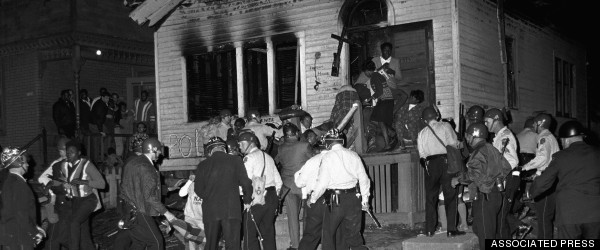
The homemade bomb that exploded outside of an NAACP chapter in Colorado this week brought back difficult memories of the long history of violence wrought against America’s oldest civil rights organization.
“One hundred-plus years of attacks of various kinds has hardened us considerably,” Julian Bond, who served as NAACP chairman from 1998 to 2010, told The Huffington Post. “We expect them and as far as we can, we prepare for them. But by its nature, one cannot prepare fully for terrorist attacks. By their nature they are surprises.”
On Tuesday morning, a homemade explosive device was detonated against an exterior wall of a building that houses the NAACP Colorado Springs chapter and a local barbershop. There were no deaths or injuries from the explosion, and only minimal surface damage was done to the wall where the explosion occurred, but chapter president Henry Allen, Jr. said the blast was strong enough to knock objects off the wall. According to the FBI, the bomb was placed near a gasoline can that failed to burst during the explosion; had the gasoline can ignited, the results could have been much worse.
While the investigation is still ongoing, the FBI said this week that it could be an act of domestic terrorism. But during a Friday press conference Tom Ravenelle, special agent in charge of the FBI’s Denver division, said that they would not speculate on the motive.
“We’re not going to call it terrorism, we’re not going to call it a hate crime, what it is is a bombing investigation,” Ravenelle said, but clarified that law enforcement is not naive to what the NAACP represents to some extremists.
“We try as best we can to be ready for attacks, and generally are prepared,” said Bond, a former Georgia state congressman who also served as the first president of civil rights law firm Southern Poverty Law Center and is now a history professor at University of Virginia. “Our membership knows it should be alert.”
Click here to read more.
